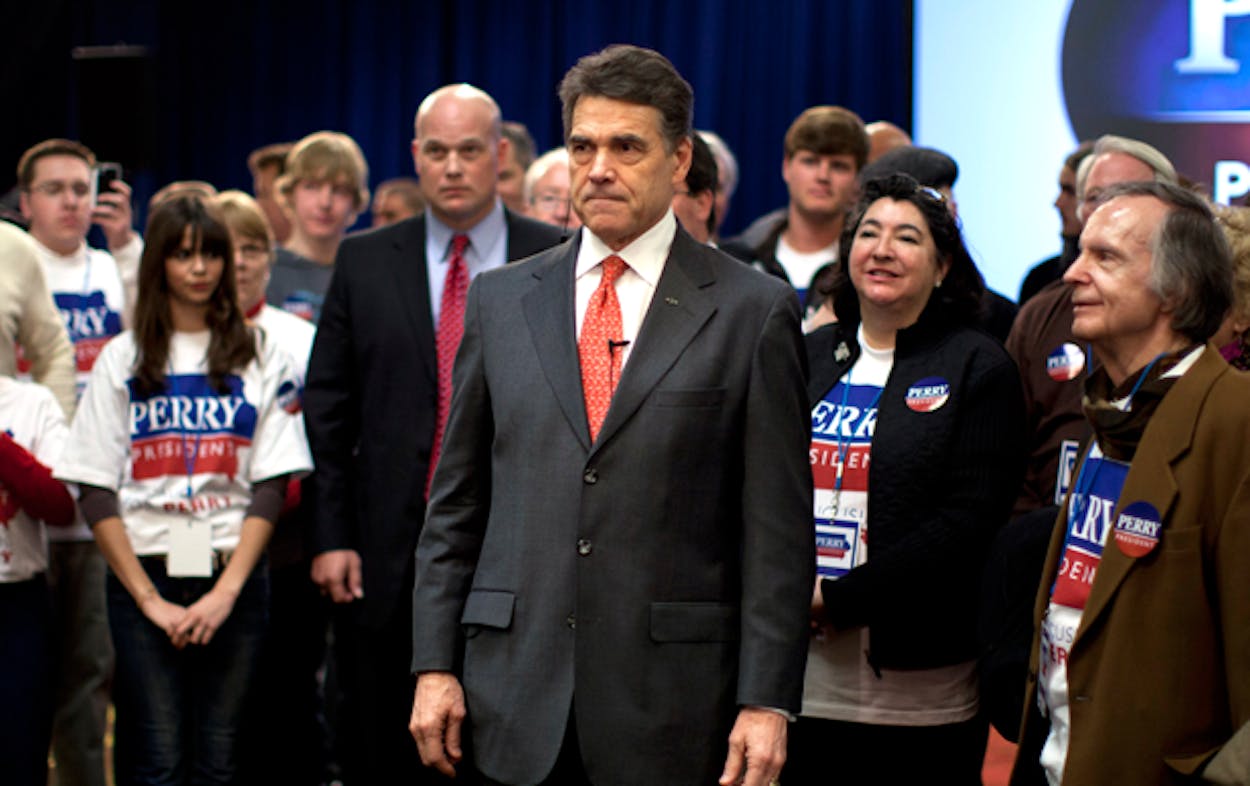And then there was one? From Texas, that is. Ron Paul finished third in the Iowa Republican presidential caucus Tuesday, earning 21 percent of the ballots behind former Massachussets governor Mitt Romney and former Pennsylvania senator Rick Santorum, who both came in with 24.6 percent. (Romney beat Santorum by eight votes.)
But the big story was Governor Rick Perry’s fifth-place finish, which prompted the one-time frontrunner to put off a planned trip to South Carolina, where the campaign was expected to focus its next round of time and money.
Instead, as Perry says in the video below, he’s coming back to Texas to “assess the results,” which, as Jason Embry of the Austin American-Statesman noted, “is likely a prelude to his formal departure in the coming days.”
One supporter, Perry’s California finance chair Jeff Miller, told Peggy Fikac of the Houston Chronicle and San Antonio Express-News that he didn’t think that it was over. (Everybody else in Fikac’s story seemed to think it was.)
“He’s got to make a strong run in South Carolina — and that’s going to be his final push and if he does well, he can go on, and if he doesn’t, it’s done,” Miller said.
Erick Erickson of the conservative blog Red State, who lives in South Carolina and gave Perry the stage for his original campaign announcement in South Carolina, wants that too, writing that Perry should fire all his political and communications, but not policy, staffers and “make an Alamo stand.” (The Alamo references are flying fast and furious today.)
“Don’t count on it happening though,” Erickson concluded.
Indeed, a Perry source in South Carolina told CNN‘s Peter Hamby, “We have been told to hold until we hear from Austin. It looks like he is not coming this week. He has definitely canceled his plans.”
Texas Monthly‘s Paul Burka compared Perry’s abrupt switch from “This is a 50 state campaign” to “reassessment” (a word Perry never actually spoke, incidentally) to LBJ’s 1968 decision not to run for reelection. Burka also suggested Perry resign as governor.
Ken Herman of the Austin American-Statesman, meanwhile, thought about Perry’s political mentor and fellow Aggie Phil Gramm, who, in 1996, also finished fifth in Iowa as a Republican presidential candidate:
That year, at the same hotel at which Perry spoke Tuesday night, I asked then U.S. Sen. Phil Gramm of Texas if he was going on to New Hampshire despite his disappointing Iowa finish.
“Yeah,” he said, “I could get run over here in the street. Other than that I’m going on to New Hampshire.”
And he did the next day, but not for long. He headed back to Washington that same day to drop out of the race. By week’s end, he had endorsed eventual nominee Bob Dole.
Last night, Perry, two hours before announcing his change of plans, said “My plan is to go to South Carolina and continue on.”
I thought back to what Gramm eventually decided post-Iowa: “When you run fifth in Iowa, an important state, you would have to be brain dead not to take a look at where you are and what you’re doing.”
As for Ron Paul, he said that he was “raring and ready to move on” to the next contest in New Hampshire, reported Texas Monthly‘s own Nate Blakeslee, in a reporting collaboration with Jay Root of the Texas Tribune.
“We will go on, we will raise the money,” Paul added.
Blakeslee and Root also wrote that “Paul seemed revved up by his apparent third place finish,” and why not? According to CNN and University of Virginia professor Larry Sabato, Paul should receive the same number of delegates (seven) as Romney and Santorum—though Iowa’s process is convoluted enough that by July, he could also end up with none (the Associated Press‘s projection) or more (in a scenario laid out by Business Insider).
Either way, as Richard A. Oppel Jr. and Sheryl Gay Stolberg of the New York Times wrote, winning is not Paul’s endgame:
…while few Republican strategists expect Mr. Paul to make it to the White House, the results last night showed that at the least he will be a force to be reckoned with in the primaries, and in his party’s politics.
If he can carry some of his momentum to other states, Mr. Paul is likely to have more influence in the national Republican Party’s platform, a goal of many of his supporters who say their anti-Fed, anti-debt and antiwar movement and message are just as important as Mr. Paul’s candidacy.
The Times also reported that nearly four in ten voters said they had never attended a caucus before, and that forty percent of those voters were Paul supporters. As Blakeslee and Root noted, Paul’s younger base was out in Iowa in force.
In the video below, Paul says that his campaign is “one of two that can actually run a national campaign and raise the money” (meaning that Santorum’s campaign can’t). “But,” he continues, “there’s nobody else that has people like you that are working hard and enthusiastic and believe in something! That is all the difference in the world.”
- More About:
- Politics & Policy
- Ron Paul
- Mitt Romney







